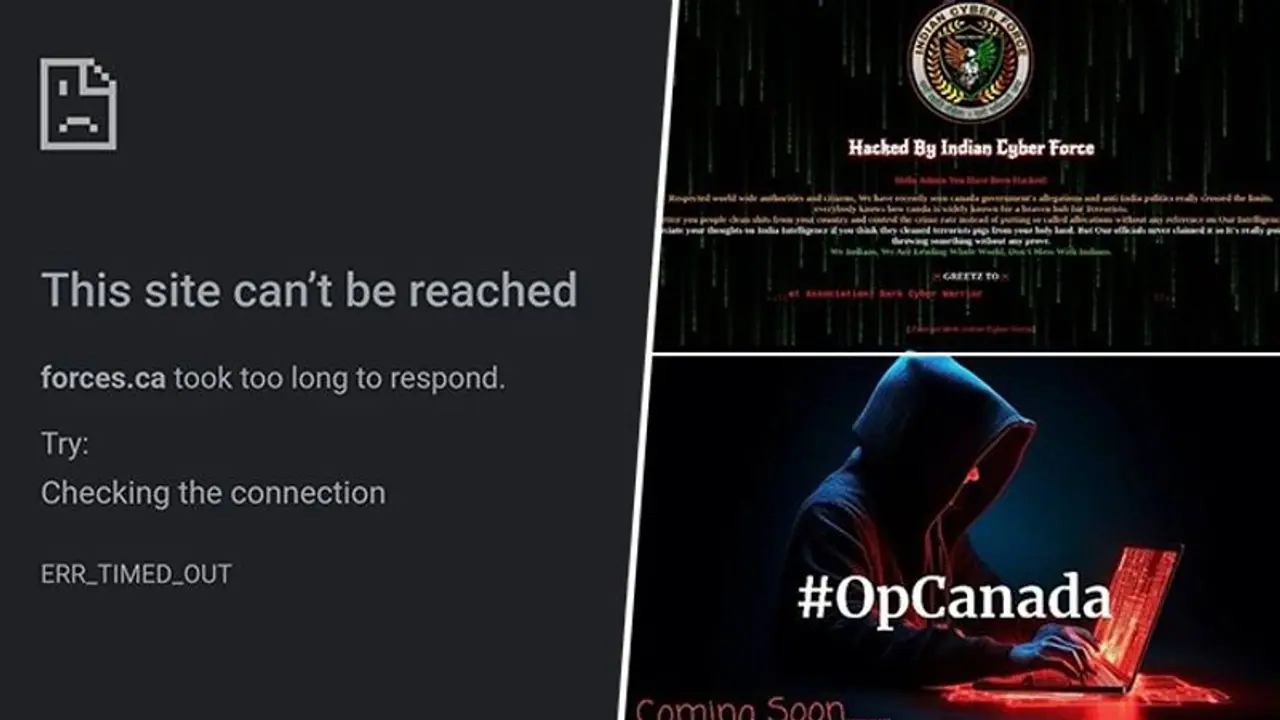Increasing diplomatic tensions between India and Canada lead to a cyber offensive by the Indian Cyber Force, #OpCanada, targeting Canadian cyber assets, including the armed forces' website.
In the backdrop of escalating diplomatic tensions, a group of Indian hackers has claimed to have initiated a campaign dubbed #OpCanada, with their crosshairs set on Canadian cyber assets, including the country's military website. The Canadian Armed Forces' website was temporarily taken offline for 2 hours on Wednesday (September 27) as part of the cyberattack orchestrated by the 'Indian Cyber Force', with the group claiming that the next target would be the Canadian IOT devices.

The Indian Cyber Force, a group of hackers that has garnered attention in recent weeks due to geopolitical tensions, publicised their actions on platforms such as Telegram and X (formerly Twitter), sharing screenshots of the Canadian military website during the attack. The group had previously announced a specific timeframe for the breach, which they successfully executed.
"Cyber alert for Canada. Get ready to feel the power of IndianCyberForce attacks will be launching on Canada cyber space in coming 3 days it's for the mess your started. #OpCanada Regards ~ IndianCyberForce," wrote the group of hackers in a September 21 post on X. Since then, the group has claimed to have hacked into database of personal database of Canadian citizens, including details of credit cards, driver's license, loan history, bank statements, emails, phone numbers, address, Canadian passports, etc.
In the following days, the Indian Cyber Force also claimed to have hacked into the Canadian manufacturing DB, website of the Canadian hospital in Ottawa, the Canadian election democracy site and the Canadian armed forces website. "Next Target Canadian IOT Devices," the group wrote in a September 27 post on X.
According to a statement to The Globe and Mail, Daniel Le Bouthillier, head of media relations at the Department of National Defence in Canada, confirmed the cyberattack on the armed forces website and its subsequent resolution. He noted that the disruption affected mobile users more significantly than desktop users. He added that the targeted website was separate from the Government of Canada's online infrastructure and internal networks. "We have no indication of broader impacts to our systems,” he added, without providing further details.
Le Bouthillier further stated that the Canadian armed forces are investigating the issue.
Last week, Canada's intelligence agency, the Communications Security Establishment (CSE), is said to have issued a warning to information and technology administrators over increase in cyberattacks amid the escalating diplomatic tensions with India. “CSE and its Canadian Centre for Cyber Security have observed that geopolitical events often result in an increase in disruptive cyber campaigns,” the agency noted.
The strained diplomatic relations between India and Canada stem from Prime Minister Justin Trudeau's announcement of an investigation into allegations that Indian government agents played a role in the killing of Hardeep Singh Nijjar, a Canadian citizen and Khalistani terrorist, in British Columbia. India has vehemently denied any involvement in the incident, dismissing the allegations as baseless. Reports have indicated that Pakistan's spy agency Inter-Services Intelligence (ISI) orchestrated Nijjar's killing to strain the relations between India and Canada.
In response to escalating diplomatic tensions, India announced the temporary suspension of visa issuance to Canadian citizens and requested Ottawa to reduce its diplomatic presence in the country. On Tuesday, during his address at the 78th session of the United Nations General Assembly, India's External Affairs Minister, S. Jaishankar, called upon all United Nations member states to base their responses to terrorism, extremism, and violence on principles rather than political convenience. He stressed the importance of respecting territorial integrity and refraining from interfering in the internal affairs of other nations, emphasising that these principles should not be subject to selective interpretation. Jaishankar declared that the era of a few powerful nations dictating the global agenda to others has come to an end.
